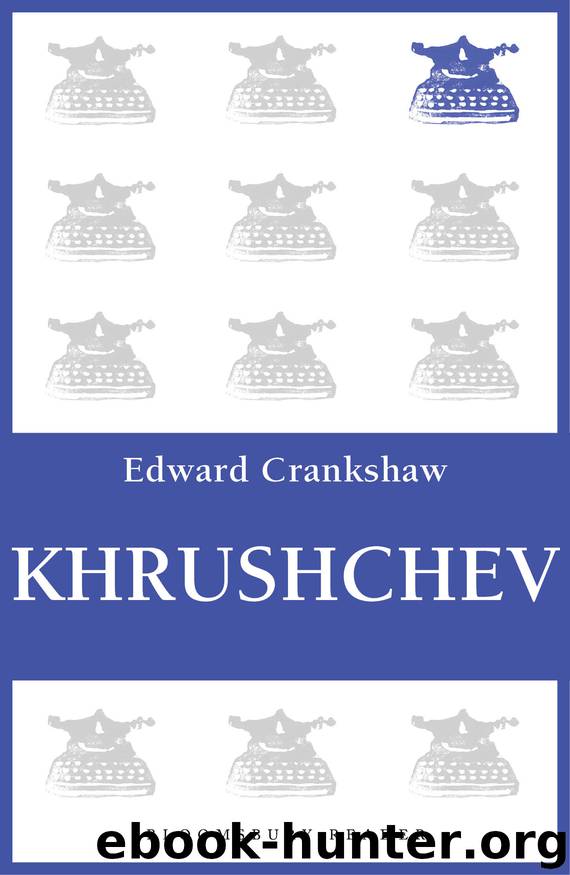Khrushchev by Edward Crankshaw

Author:Edward Crankshaw
Language: eng
Format: epub
Publisher: Bloomsbury Reader
Published: 2017-08-18T04:00:00+00:00
It may well be that these last pages have a planless and inconsequent appearance: this is intended. It is impossible to make a neat pattern of the complex violence that drove Nikita Khrushchev and haunted him and hemmed him in when, after living through the fearful sufferings of the war and the German occupation with his own people—his eldest son was killed at Stalingrad—he sought to turn himself into their benevolent and respected father, under Stalin. It was then that he let his shaven hair grow for a short period: it was an elegant silver grey, and the portraits of him at this period show a gentle, modest, father-figure, beautifully turned out. He fostered a minor personality cult of his own. Whereas all over Russia the official portraits, hung in every office, in every factory, in every shop—and on holidays plastered over every building, ten times life-size— showed always Stalin, usually Lenin, sometimes on holidays the other members of the Politburo, in the Ukraine, above all in Kiev and Kharkov, the portrait of Khrushchev alone would appear alongside Stalin’s. There were poems, too. In 1944 Khrushchev caused a collective of thirteen Ukrainian writers to compose a long poem to the glory of Stalin. It was called “To the Great Stalin from the Ukrainian People,” and it started:
Today and forever, oh, Stalin, be praised
For the light that the plants and the fields do emit!
Thou art the heart of the people, the truth and the faith!
We give Thee our thanks for the sun Thou hast lit!
The poem was submitted to Stalin together with an immense roll containing 9,316,973 signatures. In this unique memorial Khrushchev caused a niche for himself to be carved:
We’re united and solid, and no one will dare
To touch our young land which is clean as first love,
As fresh and as young with his silver-grey hair
Is Stalin’s companion, Nikita Khrushchev.7
Stalin’s companion was beginning to build up trouble for himself. As already observed, he was not quite alone in the Ukraine. Malenkov had business there as chairman of the committee for the rehabilitation of the liberated lands; Andreyev, dour and unsympathetic, had business there as agricultural overlord of the Soviet Union. Both these men watched Khrushchev’s ascendancy with jealous eyes. It is inconceivable that neither of them, above all Malenkov with his special relationship with Stalin, omitted to report unfavourably on this viceroy who was getting too big for his boots and starting to behave as though he, not Stalin, was the ruler of the Ukraine. And it is clear that for some time Stalin, who could put a stop to any nonsense when he cared to, had his own reasons for tolerating Khrushchev so long as he was useful, as he was. Khrushchev knew his Ukraine and was getting results. It would have amused Stalin, too, to watch Malenkov and Andreyev showing jealousy. Andreyev was a bore and humourless; Malenkov with his needle-sharp brain, his eyes everywhere, his tremendous natural gifts, his unrivalled inside knowledge of everyone who counted in
Download
This site does not store any files on its server. We only index and link to content provided by other sites. Please contact the content providers to delete copyright contents if any and email us, we'll remove relevant links or contents immediately.
| Africa | Americas |
| Arctic & Antarctica | Asia |
| Australia & Oceania | Europe |
| Middle East | Russia |
| United States | World |
| Ancient Civilizations | Military |
| Historical Study & Educational Resources |
Red Famine: Stalin's War on Ukraine by Anne Applebaum(2917)
Midnight in Chernobyl by Adam Higginbotham(2538)
Chernobyl by Serhii Plokhy(2534)
Midnight in Chernobyl: The Untold Story of the World's Greatest Nuclear Disaster by Adam Higginbotham(2217)
Red Shambhala by Andrei Znamenski(2191)
The House of Government by Slezkine Yuri(2190)
The Gulag Archipelago (Vintage Classics) by Aleksandr Solzhenitsyn(2092)
Red Notice by Bill Browder(2068)
All the Kremlin's Men by Mikhail Zygar(2062)
From Cold War to Hot Peace by Michael McFaul(2027)
Putin's Labyrinth(2015)
From Russia with Lunch by David Smiedt(1968)
The Future Is History by Masha Gessen(1904)
A People's Tragedy by Orlando Figes(1862)
The Romanovs by Simon Sebag Montefiore(1819)
How to Tame a Fox (and Build a Dog): Visionary Scientists and a Siberian Tale of Jump-Started Evolution by Lee Alan Dugatkin & Lyudmila Trut(1759)
The Lost Spy by Andrew Meier(1744)
Putin's Labyrinth: Spies, Murder, and the Dark Heart of the New Russia(1739)
Art and Revolution by John Berger(1716)
